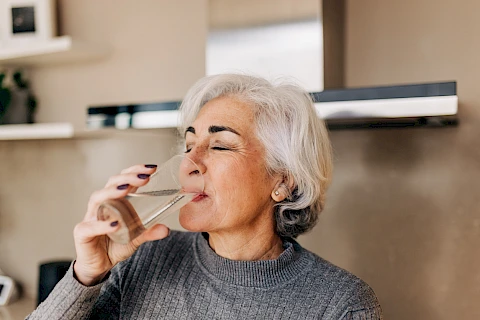
Water is essential for keeping our bodies functioning smoothly. However, seniors with incontinence might drink less water to reduce trips to the bathroom. Reducing fluid intake might seem like a good idea, but it can create more problems than it solves. Managing incontinence while staying hydrated is all about balance.
Senior Hydration Needs: What You Need to Know
Proper hydration helps regulate body temperature, supports digestion, and prevents dehydration. Seniors generally need around eight glasses of water daily to maintain healthy hydration. However, activity level, diet, and health conditions may affect individual needs. It's always wise to consult a healthcare provider for personalized advice.
Dehydration in seniors can show up as dry skin, dizziness, or fatigue. It can also impact cognitive and emotional health, potentially leading to confusion or irritability. Keeping an eye out for these signs can prevent complications.
Maintaining Healthy Hydration Levels
Maintaining hydration requires some strategies. For seniors with incontinence, hydration doesn’t have to mean drinking large amounts at once. Consistent fluid intake throughout the day ensures the body receives a steady water supply. Integrate water into daily routines by keeping a bottle nearby or setting reminders to drink regularly.
Pay attention to timing and portion control. Drink smaller amounts of water more frequently to avoid overwhelming the bladder. Avoid excessive fluid intake close to bedtime, leading to night-time bathroom trips. Spread out fluid intake throughout the day to give the bladder time to empty before bedtime.
Remember that water isn’t the only source of hydration. Consider incorporating water-rich foods into your diet to supplement your hydration levels. Foods high in water content, like cucumbers, watermelon, oranges, and strawberries, are refreshing and beneficial. Soups and broths are also excellent choices that contribute to fluid intake.
Strategies for Managing Incontinence
Managing incontinence effectively is equally crucial. Choosing the right products can help. Absorbent pads and protective garments provide security and confidence, allowing seniors to stay active without worry. Good skincare and hygiene are necessary to prevent any irritation from incontinence products.
Incorporating pelvic floor exercises can also be beneficial in managing incontinence. Strengthening pelvic muscles improves bladder control and reduces leakage. Consider integrating simple exercises like pelvic tilts or squeezes into your daily routines. Regular practice can lead to noticeable improvements in bladder function. Remember to consult your doctor before starting a new exercise routine.
Healthcare professionals can offer personalized advice that caters to specific needs. They can recommend the best incontinence products, suggest targeted exercises, or offer dietary adjustments to manage symptoms. Your healthcare team can also identify any underlying conditions that may be contributing to incontinence.
Senior Helpers Can Help With Routine Reminders and More
Balancing hydration and incontinence management can seem challenging, but with the right strategies, it's entirely possible. If you’re considering in-home care support while navigating the challenges of managing incontinence and maintaining hydration, Senior Helpers Cherry Hill is always happy to help. We provide personalized senior home care solutions, including reminders for routines, assistance with restroom use, help with daily living tasks, and more. Contact us for personalized senior care in Marlton, Mt Laurel, Haddonfield, Swedesboro, and Pennsauken!